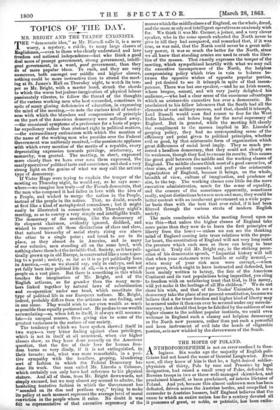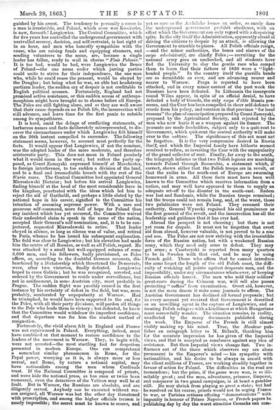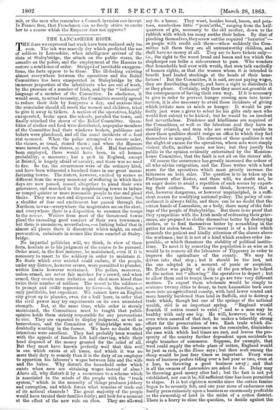guished by his arrest. The tendency to personify a cause
in a man is irresistible, and Poland, which once was Kosciusko, is now, forsooth! Langiewicz. The Central Committee, which for five years has controlled the underground government with unrivalled secrecy, decision, and self-restraint, is lost sight of in an hour, and men who honestly sympathize with the cause, who are raising funds and equipping steamers, and sending volunteers to the scene, are, because a single leader has fallen, ready to wail in chorus "Finis Polonice." It is too bad, would be bad, were Langiewicz the Bruce of Poland—the one name under which jarring parties could unite to strive for their independence, the one man who, while he could rouse the peasant, would be obeyed by the Douglas ; but being what he was, an able but headstrong partizan leader, the sudden cry of despair is not creditable to English political acumen. Fortunately, England had not promised active assistance, or this sudden access of anthropo- morphism might have brought us to shame before all Europe. The Poles are still fighting alone, and as they are well aware that their cause depends on no Polish life, the insurrection will still advance, and leave time for the first panic to subside among its sympathisers. It is hard, amid the deluge of conflicting statements, of barbarous names and facts deliberately misrepresented, to dis- cover the circumstances under which Langiewicz felt himself on the 20th instant compelled to surrender. The following statement seems, however, to account most perfectly for the facts. It would appear that Langiewicz, if not the nominee, was the adopted leader of the more moderate, and therefore aristocratic party. This does not mean in Poland precisely what it would mean in the west ; but rather the party op- posed, as Count Zamoyski expressed himself at Manchester, to foreign interference, to too sudden a division of the land, and to a final and irremediable breach with the rest of the S:avic races. The Central Committee had appointed General Mieroslawski Dictator; but before his arrival Langiewicz, finding himself at the head of the most considerable force in the kingdom, penetrated with the ideas which led him to reject the aid of Garibaldi, and perhaps a little elated by the national hope in his career, signified to the Committee his intention of assuming supreme power. With a rare and generous self-command, more full of hope for Poland than any incident which has yet occurred, the Committee waived their undoubted claim to speak in the name of the nation, accepted their General's self-nomination, and, it is to be con- jectured, requested Mieroslawski to retire. That leader obeyed in silence, so long as silence was of value, and retired to Paris, whence he has issued his subsequent explanation. The field was clear to Langiewicz ; but his elevation had made him the centre of all Russian, as well as all Polish, regard. He was attacked by a small but well-equipped column of some 3,000 men, and his followers, badly provisioned, as Poles affirm, or, according to the doubtful German accounts, dis- heartened by a Dictatorship which threatened the Democrats, were, after two victories, finally defeated. Langiewicz hoped to cross Galicia; but he was recognized, arrested, and ordered by the Government to reside under surveillance, but not in confinement, in some Austrian city, most probably in Prague. The sudden flight was possibly caused in the first instance by his certainty of defeat in the field, but was, more probably, accelerated by unpopularity at Warsaw. Had he triumphed, he would have been supported to the end, for the Poles, with all their party divisions, will pardon all things to the Pole who leads them to victory ; but defeated, he knew that the Committee would withdraw its imperfect confidence, and that departure was for him the readiest method of resignation.
Fortunately, the vivid alarm felt in England and France was not experienced in Poland. Everything, indeed, must have combined at that moment to restore confidence to the leaders of the movement in Warsaw. They, to begin with, were not arrested—the most startling fact for despotism presented in modern Europe. One can comprehend a somewhat similar phenomenon in Rome, for the Papal pov. er, worrying as it is, is always more or less unreal, and Rome, by nature a national capital, may have nationalists among the men whom Cardinals trust. If the National Committee is composed of priests, and nuns hide the national press, as has once or twice been rumoured, even the detectives of the Vatican may well be at fault. But in Warsaw, the Russians are absolute, and are diligently served. Anybody can be executed without rea- son assigned, all Warsaw was but the other day threatened with proscription, and among the higher officials treason is nearly impossible; the secret must be known to scores, and yet so sure as the Archduke issues an order, so surely does the underground government prohibit obedience, with an effect which the Government can only regard with a despairing spite. lathe city itself the Administration, apparently afraid of driving the citizens to despair by an attack, is allowing the Government to crumble to pieces. All Polish officials resign, —and the minor authorities, the bones and sinews of the corps administratif, are chiefly Poles ;— recruiting for the national army goes on unchecked, and all students have fled the University to slay the gentle race who compel them to learn that their fathers of 1830 were a "light- headed people." In the country itself the guerilla bands are as formidable as ever, and are advancing nearer and nearer to Warsaw. Praga is reported to have been attacked, and in every minor contest of the past week the Russians have been defeated. In Lithuania the insurgents round Wilna appear, in spite of an official denial, to have defeated a body of Guards, the only corps d'elite Russia pos- sesses, and the Czar has been compelled in sheer self-defence to recede from his policy, and sanction in that province "for local reasons" the plan of emancipation prepared by Count Zamoyski, proposed by the Agricultural Society, and rejected by the man who now hurls it as a weapon against its framer. The peasants are made freeholders, subject only to a quit-rent to Government, which quit-rent the central authority will make over to the noblesse. The significance of this act must not be forgotten. It is the very compromise desired in Russia itself, and which the Imperial family have hitherto seemed resolved to refuse, as investing the Czar with the unpopularity of the grand collector of rent. Finally, far away to the south, the telegraph informs us that two Polish legions are marching towards Poland through Bessarabia, a statement which, if correct, shows either that the Polish troops are in revolt, or that the exiles in the south-east of Europe are swarming homeward in arms. All these facts must have been well known to the Committee which receives information from a nation, and may well have appeared to them to supply an adequate set-off to the disaster in the south-east. Radom was lost and Sandomir, while the Russian troops remained; but the troops could not remain long, and, at the worst, those two palatinates were not Poland. They resumed their authority, General Wysocki regained his old prominence as the first general of the revolt, and the insurrection has all the leadership and guidance that it has ever had.
Abroad the prospect is not cheering ; but there is not yet room for despair. It must not be forgotten that overt aid from abroad, however valuable, is not proved to be a sine qua non. The Poles are not now striving with the irresistible force of the Russian nation, but with a weakened Russian army, which they need only arms to defeat. They may get arms ; a Czartoryski is reported from many quarters to be in Sweden with that end, and he may be using French gold. Those who affirm that he cannot introduce the arms forget the length of the old Polish coast, the diffi- culty of watching all points against desperate men, and the impossibility, under any circumstances whatsoever, of keeping Russian officials honest. The men who sold their soldiers' great-coats dining the Crimean war, will sell also passes protecting "coffins" from examination. Overt aid, however, is not the mere dream it suits some journals to affirm. The Austrian Government has declined all formal proposals ; but in every account yet received that Government is described as an unwilling agent in the capture of Langiewicz, and as treating Polish refugees with a kindliness at which Hungarians must sorrowfully wonder. The situation remains, in reality, unaffected by the many documents published during the week. The Emperor of the French is still almost visibly making up his mind. True, the Moniteur pub- lishes an autograph letter to M. Billault, thanking him for the accurate impression he has given of the Imperial views, and that is accepted as conclusive against any idea of assistance. But then Imperial views change fast. Two in- fluences out of the three which observers say are alone permanent in the Emperor's mind — his sympathy with nationalities, and his desire to be always in accord with the silent millions of France, are working steadily together in favour of action for Poland. The difficulties in the road are tremendous; but the prize, if the game were won, is so illi- mitably great ; and the man, adventurer, prisoner, Emperor, and conqueror in two grand campaigns, is at heart a gambler still. Re may shrink from playing so great a stake; but had he resolved on his course, priests would not be urging France to war, or Parisian artisans offering " demonstrations " with impunity in honour of Prince Napoleon, or French papers be publishing slay by day the worst atrocities Cossacks can corn- mit, or the men who remember a Cossack invasion can invent. Is France free, that Frenchmen can so freely strive to excite her to a course whieh the Emperor does not approve ?
































 Previous page
Previous page